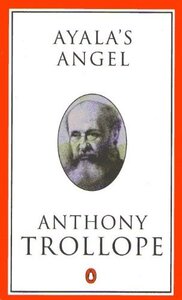
Ayala’s Angel (1881) is a rather incongruous title for a Trollope novel. However, the story deals very much with his familiar territory of marriage, inheritance, and the position of women. After the death of their imprudent artist father, penniless sisters Ayala and Lucy Dormer are separated and sent to live with different branches of the family. Lucy is taken in by her well-meaning Uncle Reginald, an Admirality clerk struggling to manage on a limited income; Ayala, meanwhile, embarks upon a more comfortable lifestyle with her wealthy aunt, Lady Tringle. Unfortunately, her two unattractive female cousins become jealous of Ayala’s beauty, and their brother Tom falls hopelessly in love with her, and refuses to take no for an answer.
Having inadvertently caused so much disruption, it is decided that Ayala should swap places with her sister, and assume a quieter existence in her uncle’s suburban home. Tom still pursues her, however, and she attracts further admirers in the form of the dull Captain Batsby and the personable but ugly Jonathan Stubbs. Ayala is perturbed by all the attention she receives, especially as none of the men reaches her ideal. She fantasises about an ‘Angel of Light’ who will love her for herself, rather than for her beauty. Ayala’s continual refusal of marriage proposals infuriates her cousins still further – they can attract only fortune hunters interested in the wealth of Sir Thomas Tringle – and they also blame her for their brother’s continuing infatuation.
Tom’s pursuit of Ayala knows no bounds, and borders on monomania. He cares little for the fact that Ayala doesn’t love him, and is determined to have her regardless. His behaviour becomes increasingly threatening, and in one uncomfortable scene he seems poised to force himself on her. He and his indulgent mother blame Ayala for her rebuttal, particularly when he turns to drink and the violent abuse of police officers. The reader is never quite sure whether Trollope’s authorial voice is being ironic in holding Ayala responsible for Tom’s indiscretions. He certainly allows almost unanimous agreement amongst his characters that an impecunious young woman should be grateful to receive a marriage proposal and clumsy approaches from a wealthy man. Beggars can’t be choosers. Although Trollope does allow his heroine a happy ending (which I shan’t spoil), his message to a female reader who might find herself in a similar position is that she can’t afford to be choosy.
The protracted and often dispiriting courtship plot is leavened considerably by Sir Thomas Tringle’s exasperation with his daughters’ suitors and husbands. His astonishingly obtuse son-in-law, Septimus Traffic, accepts an handsome dowry and establishes himself in the family home, apparently impervious to requests for him to find his own house. The impoverished Frank Houstoun, suitor to his younger daughter Gertrude, applies all his energies to extracting a dowry from Tringle, refusing to countenance the idea of getting a job. These scenes are the highlight of a slightly meandering plot that lacks narrative drive in places. Ayala’s Angel is considered by Trollope aficionados to be unjustly neglected, but I don’t think it’s amongst his stronger works. A tighter and less complicated plot would have given greater prominence to Ayala herself, who is one of Trollope’s best creations.
Ayala’s Angel by Anthony Trollope